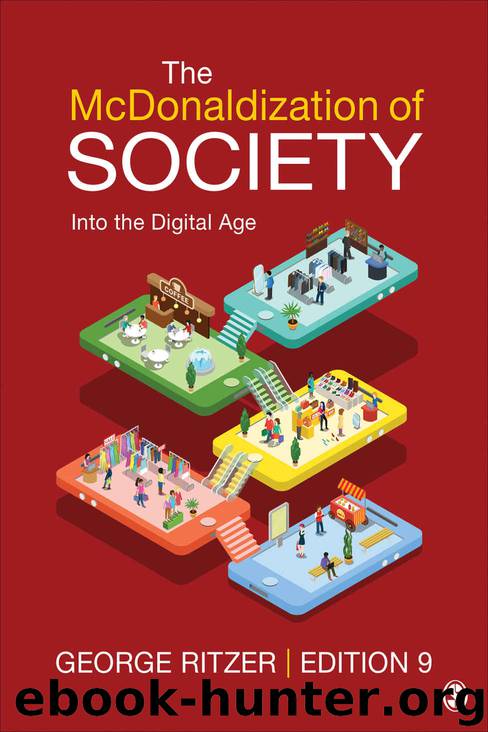The McDonaldization of Society by Ritzer George

Author:Ritzer, George
Language: eng
Format: epub
Publisher: SAGE Publications
Published: 2018-01-11T16:00:00+00:00
Above all, it is increasingly clear that cesareans have become just another service to be consumed.
Controlling the Process of Dying: Designer Deaths
We have now become consumers of death and dying, and ways have been found to rationalize the dying process, giving us at least the illusion of control. Consider the increasing array of nonhuman technologies designed to keep people alive long after they would have expired had they lived at an earlier time in history. In fact, some beneficiaries of these technologies would not want to stay alive under those conditions (a clear irrationality). Unless the physicians are following an advance directive (a living will) that explicitly states “do not resuscitate” or “no heroic measures,” people lose control over their own dying process. Family members, too, in the absence of such directives, must bow to the medical mandate to keep people alive as long as possible.
Computer systems may be used to assess a patient’s chances of survival at any given point in the dying process—90%, 50%, 10%, and so on. The actions of medical personnel are likely to be influenced by such assessments.
Death has followed much the same path as birth; that is, the dying process has been moved out of the home and beyond the control of the dying and their families and into the hands of medical personnel and hospitals.112 Physicians have gained a large measure of control over death, just as they won control over birth. Death, like birth, is increasingly likely to take place in the hospital. In 1900, only 20% of deaths took place in hospitals; about a third of U.S. deaths in 2010 occurred in hospitals, while in 2008, 20% occurred in nursing homes, and in 2011 44.6% occurred in hospices.113 The growth of hospital chains and chains of hospices, using principles derived from the fast-food restaurant, signals death’s bureaucratization, rationalization, and even McDonaldization.
The McDonaldization of the dying process, as well as of birth, has spawned a series of counterreactions—efforts by consumers to cope with the excesses of rationalization. Advance directives and living wills tell hospitals and medical personnel what they may or may not do during the dying process. Suicide societies and books such as Derek Humphry’s Final Exit114 give people instructions on how to kill themselves. There is the growing interest in and acceptance of euthanasia,115 most notably the work of “Dr. Death,” Jack Kevorkian, whose goal was to return to people control over their own deaths. Finally, many people are choosing to die at home, and some are even opting to be buried there as well.116 However, these counterreactions themselves have elements of McDonaldization. For example, Dr. Kevorkian (who died in 2011) used a nonhuman technology, a “machine,” to help people kill themselves. More generally, and strikingly, he was an advocate of a “rational policy” for the planning of death.117 The rationalization of death is thus found even in the efforts to counter it.118
Overall, the future will bring with it an increasing number of nonhuman technologies with ever-greater ability to control consumers and the consumption process.
Download
This site does not store any files on its server. We only index and link to content provided by other sites. Please contact the content providers to delete copyright contents if any and email us, we'll remove relevant links or contents immediately.
Cecilia; Or, Memoirs of an Heiress — Volume 1 by Fanny Burney(31332)
Cecilia; Or, Memoirs of an Heiress — Volume 3 by Fanny Burney(30934)
Cecilia; Or, Memoirs of an Heiress — Volume 2 by Fanny Burney(30889)
The Great Music City by Andrea Baker(21264)
We're Going to Need More Wine by Gabrielle Union(18072)
Bombshells: Glamour Girls of a Lifetime by Sullivan Steve(13107)
Pimp by Iceberg Slim(12929)
All the Missing Girls by Megan Miranda(12746)
Fifty Shades Freed by E L James(12449)
Norse Mythology by Gaiman Neil(11882)
Talking to Strangers by Malcolm Gladwell(11875)
Crazy Rich Asians by Kevin Kwan(8348)
Mindhunter: Inside the FBI's Elite Serial Crime Unit by John E. Douglas & Mark Olshaker(7833)
The Lost Art of Listening by Michael P. Nichols(6469)
Enlightenment Now: The Case for Reason, Science, Humanism, and Progress by Steven Pinker(6405)
Bad Blood by John Carreyrou(5767)
The Four Agreements by Don Miguel Ruiz(5510)
Weapons of Math Destruction by Cathy O'Neil(5034)
We Need to Talk by Celeste Headlee(4868)
